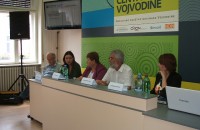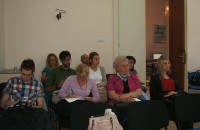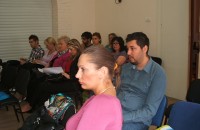Novi Sad, 03.07.2014.
On July 3rd 2014 the Igman Initiative organized the Round table Civic Monitoring of the Regional Housing Programme (RHP) With Special Focus on Providing Housing for Roma Population in Novi Sad at the premises of Independent Journalists’ Association of Vojvodina. The Round table was organized within the framework of the Project Integrating Roma Interest into the Sarajevo Housing Process supported by the Foundation Open Society Institute from Budapest. The main goal of round table was to present the findings of the Igman Initiative expert to the representatives of competent government institutions, international community, Roma organizations, CSOs and media, as well as to gather feedback from the participants for the purpose of improving the expert report.
In his introductory speech, Aleksandar Popov, Co-president of the Igman Initiative for Serbia and Coordinator of the Project, pointed out that it is shameful that after more than 20 years since the wars on the territory of the former SFRY the issue of refugees remains unsolved. According to his words, in already vulnerable group, such as refugees, is even more disadvantaged Roma national minority, which, in the most countries of the region, still encounters discrimination on many levels. Considering that it is difficult for the members of Roma population to prove their refugee status, Mr. Popov called on the representatives of government institutions to more actively participate in providing aid to Roma population and to closely cooperate with Roma organizations and activists. He pointed out that this Project should not only contribute to finding durable solutions for refugees and displaced persons but also contribute to solving other problems of political nature, as well as eliminate barriers that have emerged from the consequences of war and hostility.
Danijela Popovic Rocco, Assistant to the Commissioner for Refugees, pointed out that the number of Roma within refugee population is insignificant. However, due to their difficult position it is necessary for their issues to be solved. She also pointed out that in 2005 there was a vast number of refugees whose status had needed to be resolved, and that 2013 was a successful year for solving the status of a vast number of refuges through RHP. The program was realized in cooperation with local self-governments primarily in Vojvodina. The goal of the Program was to find durable housing solutions for 27,000 persons and it achieved good results. For example, for 200 housing units over 1000 persons applied, of which the most disadvantaged ones were selected. She pointed out that it is important for municipalities to take all necessary measures. Serbian Commissariat for Refugees is also developing cooperation with other initiatives so as to obtain all necessary financial means to provide aid for the most disadvantaged.
Ljubimka Mitrovic, representative of the UNHCR in Serbia, stated that it is important to the UNHCR for the countries signatories of the Dayton Agreement to solve the prolonged refugee crisis. According to her it is necessary for Roma, being the most disadvantaged group, to receive free legal and consequently be included in the RHP. It is also important for Roma organizations as well CSOs to get involved in resolving those issues. Positive role in this process is being played by media outlets intended for Roma population, who are providing better access to information among Roma community.
Ruzica Banda, representative of the OSCE, stated that it is important to the OSCE for Serbia to finds solutions to the issue of refugees. Resolving this issue has political character for Serbia who awaits to take over the Presidency of OSCE from Switzerland. Respect of human rights and rights of minorities and freedoms should improve the reputation of Serbia which aspires to join the EU. Resolving the issue refugees will improve inter-state cooperation which will contribute to the stabilization of relations among the former SFRY countries. It should be mentioned that the stabilization of relations was a signal to other donors, without whose help resolving refugees issue would be almost impossible. It is important for the countries to conduct public campaigns at local as well as national levels as it is for the representatives of governments to engage into dialogue with most disadvantage groups, including Roma.
Ratko Bubalo, Expert of the Igman Initiative, presented his analysis on the inclusion of Roma into the RHP. According to him Roma today encounter discrimination on many levels as well as hate speech. In the entire refugee population it is hardest for Roma to prove their refugee status. For the reason that Roma are not classified as a special group within refugee population, it is difficult for competent institutions to determine the number of Roma refugees. Hence, it is necessary to devise new methods of conducting a census of mapping Roma with refugee status. Another significant issue is that the members of Roma community do not declare themselves as Roma but as members of other minority groups. According to Ratko Bubalo new strategy should be drafted not only for Roma but also for Ashkali and Balkan Egyptians. There are also differences between Roma living in cities and those living in suburbs or villages. In cities Roma are ghettoized, therefore it is easier to reach them, while in villages they are integrated with locals, however, they still live on the edge of poverty. At the end of his analysis Mr. Bubalo drew several recommendations for solving certain issues:
– The number of Roma refugees should be determined as well as their territorial density. Through a door to door action their housing needs should be identified.
– The requirements of public calls should be adjusted to Roma population. They should be released from paying taxes and other administrative fees for obtaining documents, as well as provided with free legal aid.
– Public campaigns should be wide raging ensuring better access of information on public calls within Roma community. Roma coordinators and activists could inform Roma through door to door campaigns. In cooperation with local self-governments it is necessary to introduce certain measures for simplifying procedures of obtaining documents.
Spiro Lazinica of Humanitarian Center for Integration and Tolerance (HCIT) warned the participants that it is necessary to make more effective information access for Roma population as it is for local authorities to introduce Roma to their rights. The example of poor access to information within Roma population can be found in the communities visited by the representatives of HCIT. In those communities local authorities announced public calls for refugees via internet. Of 56 Roma families interviewed by the representatives of HCIT only one family was informed about the projects that are being implemented.
Dragana Rajic of the Roma Inclusion Office of AP Vojvodina, warned that local authorities ignore Roma coordinators as well as that municipalities do not allocate enough finds for Roma issues. She also pointed out that it is difficult to obtain accurate data for the reason that the Government often manipulates with the number of refugees, displaced persons and exiles. She suggested that the already existing network of CSOs and Roma coordinators should be utilized so as to inform Roma about their rights.
Dijana Malbasa, representative of Novi Sad Humanitarian Center (NSHC) pointed out the NSHC with its partners for quite some time now organizes terrain teams who visit Roma in cooperation with Roma coordinators. She suggested that other organizations should engage into organizing terrain teams.
Zorica Djurkovic of the Association of Roma refugees and IDPS pointed out that the special TV shows intended for Roma should be produced and broadcast so as to ensure better access to information for Roma. She, once more mentioned that competent institutions do not differentiate Roma from other refugees and that the majority of Roma declare themselves as the members of other minority groups.
Danilo Cakic of Praxis warned about the Law on Property that stipulates taxation of displaced persons as well. He deems that a petition should be signed in effort to amend the Law.
The conclusions of the Round table are as follows:
– Census of Roma refugees within the entire refugee population should be conducted.
– Mapping of territorial allocation of Roma refugees should be conducted, along with the conditions in which they live.
– Establishment of terrain teams who will organize door to door campaigns is necessary as well as the establishment of collective centers which will provide free legal aid.
– Public campaigns about public calls from competent bodies should be comprehensive so as to assure better access to information for Roma.
– Requirements of public calls should be adjusted to Roma population. Also they should be provided with aid with regards to their application process as well as released from taxes and administration fees.
– Through interviews with most disadvantaged groups their genuine needs of housing should be determined.
– Expert analyses should be conducted, along with lobby campaigns, so as to assure that competent government institutions are informed about numerous issues.
– Already existing network of CSOs and Roma coordinators should be strengthened and enhanced.




